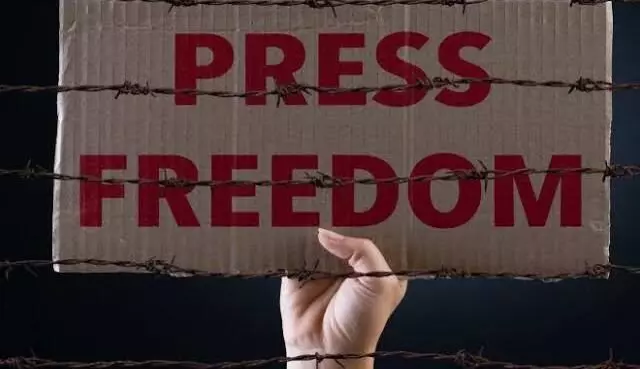
Independent organizations urge Bangladesh govt to end crackdown against journalists, critics
text_fieldsNew York: The increasing attacks in Bangladesh on journalists and others exercising their right to freely criticize government policies and practices, is alarming, eight independent organizations said on World Press Freedom Day. The widespread restrictions on freedom of expression undermine the conditions for open political debate ahead of elections, scheduled for January 2024.
Fifty-six journalists have been reportedly targeted by the government and its supporters in the first three months of 2023. Journalists in Bangladesh are at risk of arrest under the draconian Digital Security Act (DSA) and being subjected to harassment, surveillance, and physical attacks by government supporters.
On April 4, 2023, in one recent example, a group of armed assailants reportedly attacked Chattogram-based journalist Ayub Meahzi by throwing him off the roof of a two-story building. Meahzi survived but said that he believes the attack was in retaliation for his reporting on the involvement of local government officials with a group engaged in illegal land grabbing and hill cutting.
On March 30, 2023, authorities arrested Shamsuzzaman Shams, a correspondent for the leading national newspaper Prothom Alo, under the DSA, in relation to his article about the cost of living in the country. He was detained in the middle of the night and accused of publishing content “tarnishing the image of the nation,” among other charges. Matiur Rahman, the editor of Prothom Alo, executive editor Sajjad Sharif, an unnamed camera operator at the outlet, and other unidentified people were also sued under the Act, in relation to the same article. Shams has since been released on bail. Twelve days following Shams’ arrest, in a speech in parliament, Prime Minister Sheikh Hasina castigated Prothom Alo as the “enemy” of the ruling Awami League party, democracy, and the people of the country. Following Prime Minister Sheikh Hasina’s statement, a group of young people broke into the Prothom Alo office and vandalized the outer office.
We are disturbed by the continued use of the draconian Digital Security Act (DSA) against journalists in retaliation for their work on topics including governmental policies, alleged corruption, and illicit business practices in Bangladesh. The act permits heavy fines and prison sentences for those who dissent and, with broadly defined “threats”, it allows warrantless arrests based simply on a suspicion that a crime has been committed online. As of early May 2023, at least 339 DSA cases had been filed against journalists since its inception in 2018, according to a tracker operated by the Dhaka-based think tank Centre for Governance Studies.
Newsrooms are further being driven towards self-censorship, with government authorities demanding news articles being removed from their websites, as the Digital Security Act allows the Government to order the removal and blocking of any information or data on the internet it deems necessary. The DSA also allows for invasive surveillance by permitting authorities to require service providers and other intermediaries to hand over data without requiring a court-obtained warrant.
Bangladeshi authorities are also weaponizing other laws against journalists. On February 20, 2023, the Bangladesh authorities stopped the publication of the Dainik Dinkal, after the Bangladesh Press Council, a Ministry of Interior offshoot, rejected its appeal against a government shutdown order on the grounds of violating the Printing Presses and Publications (Declaration and Registration) Act. Previously, the authorities blocked 54 news websites, with the declared aim of preventing the spread of “rumours” ahead of the December 2018 national election. Prothom Alo special correspondent Rozina Islam faces ongoing prosecution in an investigation under the colonial-era Official Secrets Act and the penal code, in apparent retaliation for her reporting on alleged government corruption and irregularities in the public health sector at the outset of the Covid-19 pandemic.
Further, we are alarmed by the ongoing, pervasive impunity regarding violence against journalists, including authorities’ failure to make progress in the investigation into the 2012 murder of journalist couple Sagar Sarowar and Meherun Runi, with the Rapid Action Battalion deferring the submission of its probe report to the court at least 95 times.
The increasing repression and curtailment of the right to freedom of expression is having a chilling effect on journalists and civil society, and seriously stifling journalistic freedoms. The 2022 World Press Freedom Index compiled by Reporters Without Borders ranked Bangladesh at 162 out of 180, the worst-performing country in South Asia.
The Bangladesh government’s suppression of free speech and media freedom is inconsistent with Article 39 of the country’s constitution and Article 19 of Bangladesh’s obligations under the International Covenant on Civil and Political Rights (ICCPR).
The Bangladeshi government should:
Immediately suspend the use of the Digital Security Act pending its repeal or amendment in line with international human rights law.
Conduct swift, impartial, transparent, and effective investigations into all acts of violence against journalists and hold any suspected perpetrators accountable in fair trials.
Drop all charges against all who have been accused simply of exercising their right to freedom of expression.
End harassment of journalists and protect media freedom. Ensure that people can voice criticism and concerns, both offline and online, without fearing sanctions.
End misuse of laws to curtail the right to freedom of expression in Bangladesh and protect the media’s right to operate freely and independently and respect the public’s right to information through full and unrestricted access to news outlets.
Signed by
Amnesty International
CIVICUS: World Alliance for Citizen Participation
Committee to Project Journalists
Human Rights Watch
International Federation for Human Rights
Reporters Without Borders
For more information, please contact:
In London, Meenakshi Ganguly (English, Bengali, Hindi): +91-9820-036032 (mobile); or gangulm@hrw.org. Twitter: @mg241






















